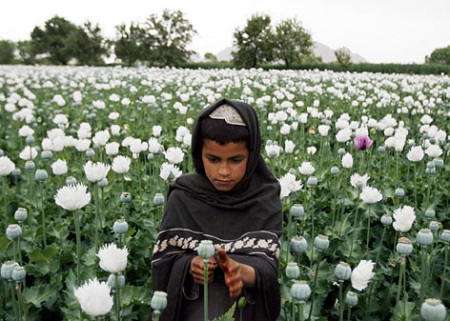By Lalit K Jha

An Afghan boy works in an opium poppy field Saturday in Musa Qala in Helmand province. Poppy production has skyrocketed since 2001. (Photo: Omar Sobhani / Reuters)
US President Barack Obama has identified 22 countries, including India, Pakistan and Afghanistan as major drug transit or illegal drug producing countries.
In a presidential determination, Obama designated Bolivia Myanmar and Venezuela as the three countries that have demonstrably failed, during the previous 12 months, to make substantial efforts to adhere to their obligations under international counter narcotic agreements.
However, Obama said a country''s presence on the Majors List is not necessarily an adverse reflection of its government''s counter narcotic efforts or level of cooperation with the US.
Noting that Afghanistan remains the world''s largest producer of opium poppy and a major source of heroin, the presidential determination signed by Obama said although the amount of opium poppy cultivated in Pakistan is much less than Afghanistan, the country continues to qualify as a major drug producing country, with an estimated 1,700 hectares of opium poppy under cultivation.
Pakistan also remains a major transit country for opiates and hashish for markets around the world and is a transit country for precursor chemicals illegally smuggled to Afghanistan, where they are used to process heroin, he said.
"Bilateral cooperation between Pakistan and the US continues to support Pakistan''s goal of returning to poppy-free status. US government support focuses especially on upgrading the institutional capacity of Pakistan''s law enforcement agencies," it said.
Primary trafficking routes from Afghanistan, where poppy cultivation is still mostly confined to the southern and western provinces, are through Iran to Turkey and Western Europe; through Pakistan to Africa, Asia, and the Middle East; and through Central Asia to the Russian Federation.
Helmand Province remains the largest grower of opium poppy in Afghanistan, but the Provincial government''s innovative Food Zone program, which provides farmers with wheat seed and fertilizer in exchange for a pledge not to grow poppy, coupled with credible law enforcement, has reduced Helmand''s poppy cultivation by a third, to 69,883 hectares in 2009 and even further to 65,043 hectares in 2010, it said.
"The US-funded Governor Led Eradication (GLE) programme has demonstrated progress in Helmand with 2,111 hectares eradicated by May 2011 end. To date during 2011, a total of 3,827 hectares of GLE has been verified in 17 provinces throughout the country, an increase of more than 45 per cent in eradication over the same time last year," Obama said.



